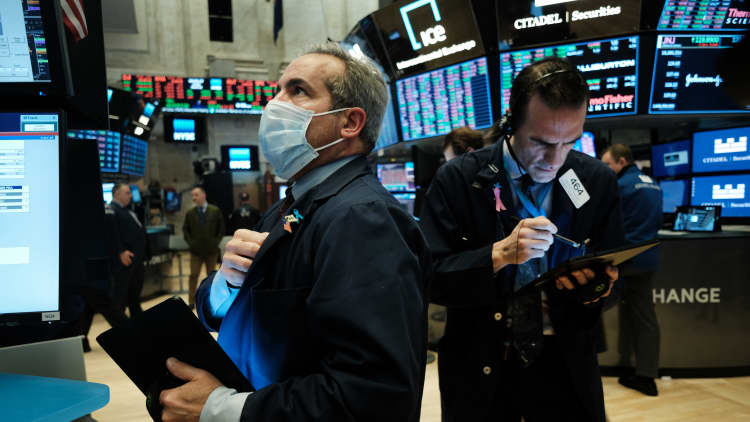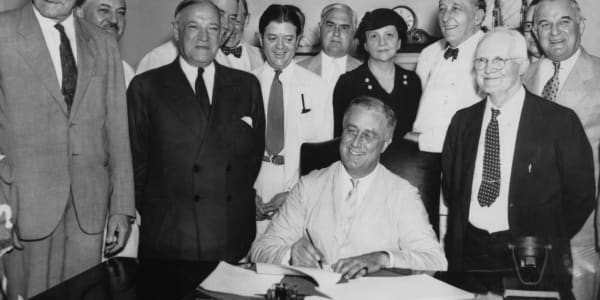When it comes to investing decisions, there's a chance your financial advisor is helping save you from yourself.
How? By accounting for the fact that, well, you're human.
While they aren't exactly doing mind tricks, some advisors use behavioral finance techniques that may have helped protect clients from their own worst instincts during the early year market drop in the wake of the Covid-19 pandemic, a study suggests. And there are probably lessons there for do-it-yourself investors as well.
More from Your Money Mindset:
College kids worry about finances amid ongoing pandemic
Op-ed: Non-profit sector needs the generosity of investors
Americans are raiding retirement savings during pandemic
"In general, it's about getting to know the client," said Omar Aguilar, chief investment officer of passive equity and multi-asset strategies at Charles Schwab Investment Management, which recently released its BeFi Barometer 2020 in collaboration with the Investments & Wealth Institute and Cerulli Associates.
"At the end of the day, we recognize that we're all human and we all have different triggers for our behaviors," said Aguilar, who has more than 20 years under his belt as a practitioner of behavioral finance in asset management.
The S&P 500 index, a broad measure of how U.S. companies are faring, dropped 33.9% to 2,237.40 on March 23 from its Feb. 19 high of 3,386.15. However, it then soared 60% to a new high of 3,580.84 on Sept. 2. Since then, volatility has ruled — and is expected to persist as the U.S. economy continues to recover from the effects of the coronavirus pandemic.

Generally speaking, behavioral finance aims to understand and account for how investors and markets behave by looking at how they respond to various events and situations, rather than how they should behave in order to get the optimal financial outcome.
"As an investor, you need to have a fundamental understanding that you are wired to do the absolute wrong thing at every point in the process," said financial psychologist Brad Klontz, who also is a certified financial planner and managing principal of Your Mental Wealth Advisors in Boulder, Colorado.
"When we're scared or excited, or anytime we're emotionally charged, we become rationally challenged," Klontz said. "Your emotions take over and your thinking brain goes offline."
As an investor, you need to have a fundamental understanding that you are wired to do the absolute wrong thing at every point in the process.Brad KlontzManaging principal of Your Mental Wealth Advisors
For instance, while buying low and selling high comes with the best results for an investor, emotional decisions can spur the opposite behavior (selling after the market has dropped and buying after prices already have shot up).
So if your advisor uses behavioral finance insights, they may be able to, say, help prevent you from acting on emotions that could lead to a poor financial outcome, or may help with decisions by factoring in your emotions and human tendencies.
For example, if their communications with you long before a market nosedive includes a warning of sorts that stocks can tank, and how that can best be handled — i.e., stick to your financial plan, rebalance if necessary — you may be more prepared for the downside and less likely to make a rash decision.
The BeFi Barometer 2020 is based on survey answers from 300 advisors who are members of the Investment & Wealth Institute. Of the 81% who said they use behavioral finance techniques — up from 71% a year ago — the biggest benefits during the first-quarter market meltdown were:
- Kept clients invested during market volatility (55%)
- Strengthened trust and relationship with clients/increasing client retention (48%)
- Better managed client expectations through effective communication (40%)
- Reduced short-term or emotional decision making (37%)
- Developed better understanding of clients comfort levels with risk (33%)
Of course, part of the puzzle is understanding and recognizing the biases that humans carry. The surveyed advisors said the biggest ones they saw during the first quarter were:
Top 5 biases seen by advisors
| Clients Significantly Exhibit� | 2019 | 2020 |
|---|---|---|
| Recency Bias: Easily influenced by recent news events or experiences | 35% | 35% |
| Loss Aversion: Playing it safe or accepting less risk than they should tolerate | 26% | 30% |
| Familiarity/Home Bias: Preference to invest in familiar (U.S. domiciled) companies | 24% | 27% |
| Framing: Make decisions based on the way the information is presented | 17% | 26% |
| Mental Accounting: Separating wealth into different buckets based on financial goals | 15% | 26% |
Source: BeFi Barometer 2020
Of course, it may be hard to identify your own biases in the heat of the moment, especially in a time of crisis like the Covid-19 pandemic and ensuring economic chaos.
"My advice is to put some time between impulse and action in every area of your life, including your investment portfolio," Klontz said.
He said that advisors also need to recognize they aren't immune to making emotional decisions in times of market stress.
"I'm an advisor and I don't trust my instincts around it at all," Klontz said. "We [our firm] essentially respond in a very disciplined and quantitative way to what's happening. Otherwise it would be a disaster."





